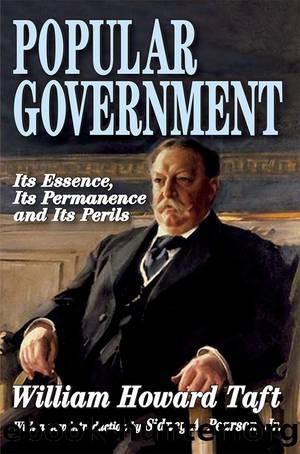Popular Government and the Anti-Trust Act and the Supreme Court by William Howard Taft

Author:William Howard Taft [Taft, William Howard]
Language: eng
Format: epub
Tags: History, 20th Century, United States
ISBN: 9780821414576
Google: HU8fAQAAMAAJ
Goodreads: 1364958
Publisher: Ohio University Press
Published: 2003-01-15T12:40:27+00:00
VI
âIN ORDER TO FORM A MORE PERFECT UNIONâ
The first purpose stated in the preamble of the Constitution for its framing and adoption was âin order to form a more perfect union.â The Articles of Confederation, under which the War of the Revolution had been conducted, were inadequate in many particulars. The Continental Congress really had but little power. It conducted the war through committees; it appointed the commanding generals, but its requisitions upon States for money and men were nothing but recommendations, sometimes followed and sometimes ignored, and its exercise of the function of law-making was very limited.
The condition of the colonies after the recognition of our independence by Great Britain was not encouraging. There was no authority anywhere sufficient to better conditions. Hamiltonâs description was not an exaggeration when he wrote in The Federalist in Paper XV:
âWe may indeed, with propriety, be said to have reached almost the last stage of national humiliation. There is scarcely any thing that can wound the pride, or degrade the character, of an independent people, which we do not experience. Are there engagements, to the performance of which we are held by every tie respectable among men? These are the subjects of constant and unblushing violation. Do we owe debts to foreigners, and to our own citizens, contracted in a time of imminent peril, for the preservation of our political existence? These remain without any proper or satisfactory provision for their discharge. Have we valuable territories and important posts in the possession of a foreign power, which, by express stipulations, ought long since to have been surrendered? These are still retained, to the prejudice of our interest not less than of our rights. Are we in a condition to resent, or to repeal the aggression? We have neither troops, nor treasury, nor government. Are we even in a condition to remonstrate with dignity? The just imputations on our own faith, in respect to the same treaty, ought first to be removed. Are we entitled, by nature and compact, to a free participation in the navigation of the Mississippi ? Spain excludes us from it. Is public credit an indispensable resource in time of public danger? We seem to have abandoned its cause as desperate and irretrievable. Is commerce of importance to national wealth? Ours is at the lowest point of declension. Is respectability in the eyes of foreign powers, a safeguard against foreign encroachments? The imbecility of our government even forbids them to treat with us. Our ambassadors abroad are the mere pageants of mimic sovereignty.â
After speaking of the unnatural decrease in the value of land, and the absence of private credit, he said:
âTo shorten an enumeration of particulars which can afford neither pleasure nor instruction, it may in general be demanded what indication is there of national disorder, poverty, and insignificance, that could befall a community so peculiarly blessed with natural advantages as we are, which does not form a part of the dark catalogue of our public misfortunes?â
He points out the
Download
This site does not store any files on its server. We only index and link to content provided by other sites. Please contact the content providers to delete copyright contents if any and email us, we'll remove relevant links or contents immediately.
2010-The City & the City by China Miéville(1990)
Anatomy of Injustice by Raymond Bonner(1664)
That Every Man Be Armed by Stephen P. Halbrook(1579)
ADHD on Trial by Michael Gordon(1574)
Injustices by Ian Millhiser(1497)
You Don't Own Me by Orly Lobel(1445)
Tell by Major Margaret Witt(1438)
Course Correction by Ginny Gilder(1409)
Broken Scales by Joel Cohen(1352)
Without Copyrights by Spoo Robert(1347)
A Vast Conspiracy by Jeffrey Toobin(1327)
First by Evan Thomas(1284)
J by Howard Jacobson(1256)
A Religious Orgy in Tennessee by H.L. Mencken(1251)
The Run of His Life: The People v. O. J. Simpson by Jeffrey Toobin(1214)
A Triumph of Genius: Edwin Land, Polaroid, and the Kodak Patent War by Ronald K. Fierstein(1203)
A History Of Thailand by Baker Chris(1190)
John Wayne Gacy by Judge Sam Amirante(1114)
Law 101: Everything You Need to Know About American Law, Fourth Edition by Jay Feinman(1101)
